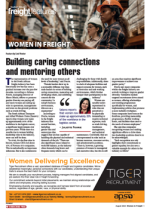The representation of women in the South African freight industry has been historically low but has seen a gradual increase over the past few decades. According to Juliette Fourie, managing director of Metro Minds, efforts to promote gender diversity are paying off, and more women are taking up roles in operations, management and even on-the-ground positions such as truck driving. The South African Transport and Allied Workers Union (Satawu) reports that women now make up approximately 20% of the workforce in the logistics sector, a significant improvement over previous years. While there is a notable rise in women holding leadership roles in the industry, more can still be done.“In 2023, for the first time in history, women CEOs led about 10% of Fortune 500 companies. This is undoubtedly an important milestone. But it also underscores the need for more women at all levels of leadership,” said Fourie. “Female leaders show up in a noticeably different way than male leaders in terms of building caring connections, mentoring and developing others, and exhibiting concern for the community. In today’s business environment, this acts as a superpower.”According to Fourie, women in the freight industry face several barriers, including gender bias and stereotypes that suggest they are less capable of handling the physical and technical demands of the job. “There are also significant issues related to work-life balance, as the industry often demands long hours and frequent travel, which can be challenging for those with family responsibilities. Additionally, there is a lack of adequate facilities and support systems for women, such as restrooms and safe working environments, which further hamper their participation in the industry.”Women a re notably under-represented in roles that are perceived to be physically demanding or require technical expertise, such as truck driving, warehouse management, and technical maintenance. Conversely, they are overrepresented in roles such as human resources, customer service, and administrative positions. “There is, however, a growing presence of women in managerial and executive roles, but this is still an area that requires significant improvement to achieve true gender parity.”Fourie says many companies within the freight industry are actively working to improve gender diversity. “Initiatives include targeted recruitment drives aimed at women, offering scholarships and training programmes specifically for women, and implementing policies that promote a more inclusive workplace. Some companies have been at the forefront, providing mentorship programmes, f lexible working hours, and facilities that cater to the needs of women employees.”She says that companies recognising women and making significant efforts to drive them into leadership positions deserve to be acknowledged."Such recognition not only highlights their commitment to gender equality, but also sets a valuable example for others in the industry to follow."

